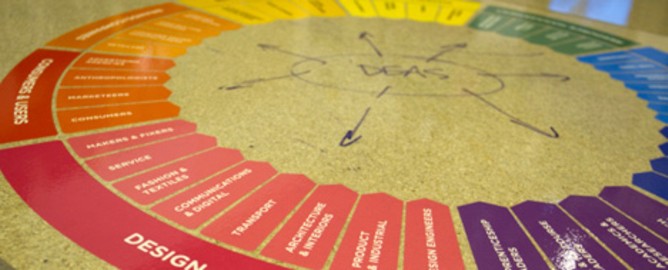The Future is Circular: New Rules for Sustainable Purchasing
By Natalie Duronio
Our planet and societies are changing in response to environmental pressures, and this change is opening the business community up to new and constantly-evolving risks and constraints.
All the while, businesses and other organizations continue to need to be cost-conscious – but some strategies that are cost-saving on the face of things, such as always buying the cheapest goods and services we can find, are actually causing us to waste money and resources overall.
Across the board, we need to take a serious look at our supply chains and procurement practices in order to navigate the world ahead.
The most progressive and innovative organizations are now looking to a transformed kind of economy: a “circular” economy – and they are using their procurement practices to help get there.
Circular economy principles go beyond the re-use and recycling of materials to a new model in which consumption and production are carefully thought through so that the end result is no waste at all.
This might sound radical, but it’s not a fringe idea anymore.
In May 2017, the Financial Times hosted the FT Circular Economy Summit in London, England to “examine how businesses are transforming product lifecycles and organizational infrastructure to become more sustainable, with a dual focus on environmental responsibility and commercial value.”
Innovative thinkers shared ideas about designing products and services for the reuse and repurposing of materials and the regeneration of natural capital.
What if you’re not primarily a designer or producer of products? The latest annual report from the Municipal Collaboration for Sustainable Procurement (MCSP) finds that those who purchase products and services will have as much – or perhaps even more – of a role in driving the transition as those who supply them.
Organizations that are striving for sustainability now realize that it is imperative to look to their supply chains in order to address the most material aspects of their environmental and social impacts, as well as to improve financial performance. \They’ve learned that buying the cheapest goods and services doesn’t typically save money in the long run.
Nor does it pay off in terms of reducing exposure to real risks or addressing myriad other environmental, social, and ethical priorities. Procurement that supports a circular economy means avoiding regulatory and reputational risks, and risks due to climate change, resource scarcity, or rising prices.
Fortunately, there are actionable steps that you can take to advance your organization’s supply chain practices toward circularity and your organization toward greater resiliency.
- Think strategically about procurement. Executives must begin to see procurement as a strategic function that can help their organization achieve its most important corporate goals. Walking the talk in this regard means adequately resourcing the procurement department so that the organization as a whole can take a strategic and well thought-out approach to what they are buying. It means ensuring that opportunities for circular economy purchasing are not missed due to a compressed timeframe need for procuring goods and services. It also means ensuring that lifecycle costs of purchases are regularly considered, and that the total cost of ownership is given precedence over up-front purchase price when the organization is buying.
- Collaborate with suppliers as partners. The transition to a circular economy will take all parties working together. Procurement team members and contract managers must proactively engage with suppliers to learn from each other, drive innovation, and jointly take action toward a waste-free and low-carbon economy.
- Invest in training. Finance and executive budget-holders must make appropriate investments to ensure that employees understand sustainable and circular economy principles and how to apply them to their purchasing of goods and services. Training is highly important for employees within the procurement department, but it’s also vital for developing end-user and client departments’ competencies with respect to how they are to consistently consider sustainability risks and opportunities when setting specifications for the goods and services they need to conduct their business.
- Recruit for the future of procurement. Human Resources and Supply Chain teams must make a conscious effort to ensure that job descriptions and recruiting strategies appropriately ask for an innovative mindset and a willingness to learn about and apply – if not experience with – circular economy principles. This will ensure that procurement professionals in the organization are set up for success in transitioning to more sustainable procurement practices.
A circular economy is our future. Organizations that are at the forefront of adopting circular economy principles and driving change will be best positioned and most resilient to the changing climate and world economy.
Leading organizations recognize that the shift must start with their supply chains: adopting a circular economy mindset means thinking through purchases now to avoid waste later.
This is why significant purchasers of goods and services, including large public organizations, such as federal and provincial governments, municipalities and post-secondary educational institutions, need to be leading the charge in terms of transforming their procurement practices toward sustainability and a circular economy.
Natalie Duronio is a Consultant who works with Reeve Consulting, a Vancouver-based consultancy specializing in sustainable supply chain and procurement. Reeve Consulting also manages the Municipal Collaboration for Sustainable Procurement (MCSP), for which Natalie serves as the Program Coordinator. To learn more about advancing sustainable procurement practices, check out the MCSP’s latest Annual Report as well as the Urban Sustainability Directors Network’s Sustainable Procurement Playbook. Natalie can be reached at natalie@reeveconsulting.com
About the MCSP: The MCSP is a group of Canadian municipalities and post-secondary institutions collaborating to share information, resources and best practices for sustainable procurement, with the goal of improving strategic outcomes and collectively influencing the marketplace toward a sustainable economy.




